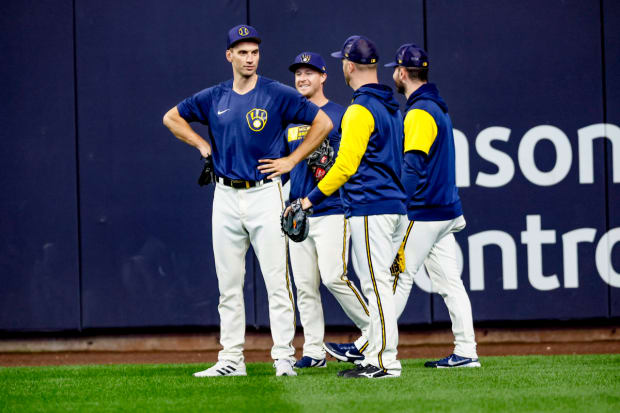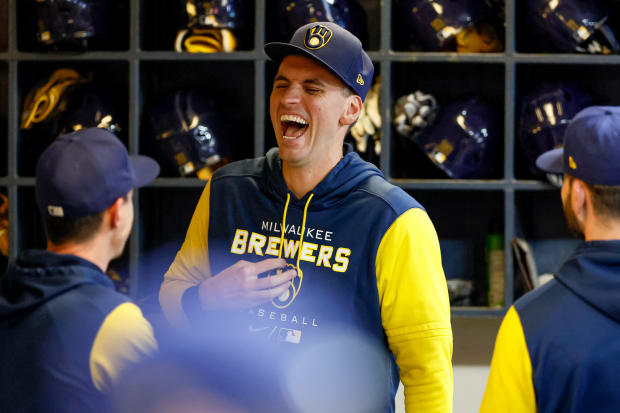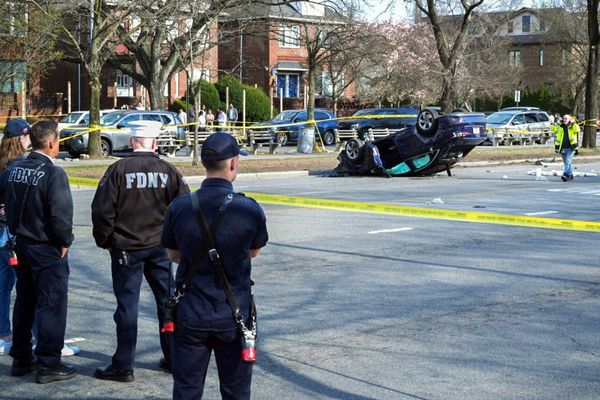Welcome to SI Climate, our ongoing series about how sports are adapting to—and affecting—our changing world.

The first thing Brandon Woodruff noticed about Brent Suter was his water bottle.
It wasn’t the reusable bottle itself, exactly, that stood out to him. It was Suter’s commitment to it. The two pitchers met as minor leaguers at Brewers spring training in 2015, and Woodruff noticed that Suter seemed to bring the bottle with him everywhere, from clubhouse to ballfield to dugout and back—almost more like a security blanket than a drinking receptacle.
“He was carrying it around at all times,” Woodruff recalls. “Like, all times.”
It took a while. But finally, Woodruff asked: What’s the deal? A lucky charm? A fear of drinking any of the bottled water that was readily available around the complex? Nope, Suter explained: He was just really passionate about the environment and wanted to stay away from single-use plastic.
Now, the two are good friends who have forged big-league careers alongside one another. (Literally: Their lockers were side by side in the Brewers’ clubhouse.) But one thing hasn’t changed: “The most impressive thing is, ever since I’ve known him, he’s done it every day,” Woodruff says. “I’ve never seen him without a bottle.” It’s just one of a slew of his environmentally conscious behaviors that teammates can rattle off.
Such as: The 33-year-old reliever brings his own reusable containers to limit waste from meals on road trips. He doesn’t eat red meat. He drives an electric car. And he keeps an eye on water usage.
“He’s in and out of the shower so quick,” Woodruff marvels. “I’m not saying he doesn’t wash himself. But he’s so fast… I’m like, dude, I can’t do that.”
The care goes beyond his lifestyle choices. Suter has advocated for environmental legislation and is involved with several related nonprofit groups. In his seven big-league seasons with the Brewers, he worked with the team on sustainability initiatives at the ballpark and elsewhere in Milwaukee. (He was acquired by the Rockies earlier this offseason.) Suter’s interest also predates his time in organized baseball: He studied environmental science and public policy at Harvard. But when it comes to the question of how to get his fellow athletes to care—how to start clubhouse conversations around a subject that can be politicized, touchy and highly personal—he found during his time in Milwaukee that the best place to start is simple. Suter just goes about his daily business. And if questions follow, he’ll be more than happy to answer, in as little or as much detail as requested.
“I know I’m the treehugger, and it’s one of those things where it’s like, yes, I’ll wear that label proudly, ” he says with a laugh. “But I also want to bring people on board, so I don’t want to make it seem too weird…. I’m just trying to tell them what I’m doing and why I’m doing it, and I’ll invite them to hop on, too.”

David E. Klutho/Sports Illustrated
It didn’t happen overnight, and it doesn’t always stick, but Suter saw his efforts begin to pay off with the Brewers. When he began pledging funds to plant trees for every team win, his fellow relievers eventually matched him, with members of the bullpen donating for every hold and save. In April, he helped the club launch its new sustainability council, and in May, teammates joined him to work in a local urban garden before a game. He didn’t convince anyone else to give up red meat entirely, but a few guys joined him for Meatless Mondays, while others embraced the effort to cut down on plastic in the clubhouse. Suter isn’t naive about the impact: He understands the team’s (and league’s) carbon footprint is bigger and more complex than any of these individualized actions—and that many long-term, macro-level questions here are far bigger still. But as a way to get players thinking about their role here, and talking about what it means to get involved, he’s been encouraged by the progress.
And one more thing: Admittedly, he sometimes forgets it at home, but Woodruff has a reusable water bottle now, too.
Suter has cited the 2006 documentary An Inconvenient Truth as the awakening for his environmental activism. But a more general interest in the planet took root for him much earlier. The Cincinnati native has fond childhood memories of gardening at his grandfather’s lakeside house in Kentucky: “Getting in touch with nature that way really helped me fall in love with it.” He soon developed an interest in recycling and carpooling. Later, when he went to college, he knew just what he wanted to study.
For a long time, Suter focused mostly on what he could do personally to help the environment. Over the last few years, however, that began to shift. He still looks for areas he can go further in his own daily life. But he’s grown increasingly interested in what he can do to get others to join—in baseball and beyond.
“It was, ‘O.K., I’m walking the walk, so let’s spread the messaging and try to get other people involved,’” he says.
He appreciated that being an MLB player came with a platform. But it was one thing to post about the environment to a general audience on social media. It was another to start the conversation in his own workplace: A baseball clubhouse is not exactly the most natural setting for some of those discussions. So he settled on a low-key approach. He owned all of the life choices that his teammates had already started to notice. And when it made sense, Suter tried to explain more in an open, non-judgmental way.

David E. Klutho/Sports Illustrated
“I get ribbed all the time for being liberal or whatever, because a lot of baseball players do tend to be conservative,” he says. “And so being on the other side, at least on the environmental spectrum, it’s different… I try to talk about it, to work it in, without trying to be preachy.”
It helped that many of these lifestyle decisions came across as personal, rather than political, even if they were really both: These conversations didn’t have to feel like they were about politics. It didn’t necessarily win everyone over, at least not at first, but it got the ball rolling. And Suter was happy to find that his conversations revealed another group of players, too. There were plenty of guys who did care about the environment but were unsure about how to start doing more.
That included Brewers infielder Keston Hiura, who developed an early interest in nature as a kid growing up in California, where he loved going to the beach.
“He introduced me to a lot of different things on this where we can use our platform,” Hiura says of Suter. “He’s just been a huge help.”
The pitcher linked Hiura with an athlete environmental advocacy group founded by retired MLB outfielder Chris Dickerson called Players for the Planet. Hiura is now an ambassador for the organization, focused specifically on ocean health, and has participated in events like a beach clean-up last winter in the Dominican Republic. He doesn’t have quite the tree-hugging clubhouse rep of Suter. (It would be hard for anyone to.) But he’s committed to learning more, and that can spread to the rest of the team, too: As others sign on, it feels more like environmentalism can be a group effort, and less like it’s relying on just one player as a spokesman.
“I’ve always been interested, and I just wasn’t sure how to get involved,” Hiura says. “But Suter’s been the one to kind of head all this up.”
Suter is encouraged by the progress he’s made in his own clubhouse: It no longer feels weird (or, at least, not that weird) to have a team conversation about single-use plastic. In some ways, however, Suter’s still on his own. Across sports, in a cultural landscape where more athletes have spoken on all sorts of social and political causes in recent years, the environment can still feel like something of a niche cause. There are groups like the Green Sports Alliance and Players for the Planet—with dozens of ambassadors across various leagues supporting various environmental projects—and plenty of initiatives at the team level. Yet big, public league-wide campaigns on the subject are still rare. So through trial and error, Suter has tried to learn what resonates with people here and what doesn’t. Anything with too much of a doomsday vibe shuts conversations down. Anything too big turns people off—yes, he’s concerned about how much flying is part of MLB, but he realizes that using that as a starting point can make teammates feel like the problem is something intractable above their pay grades. And anything too abstract just won’t connect.
Last year, for instance, Suter was excited about launching a team carbon offset program—only to see everyone’s eyes glaze over when he used the word “sequestration.” So this year, he decided to narrow the public focus to something more tangible. That’s planting trees—which, yes, were part of the carbon offset program to begin with, but by making them the center of the conversation, it’s easier to communicate the mission and get people interested.
“People just connect…with stuff they can see,” Suter says.
Suter had already begun pledging funds to plant 100 trees for every team win in 2021. This year, Milwaukee reliever Devin Williams announced he would donate to plant 50 trees for each hold or save he recorded. Former Brewers closer Josh Hader (traded this summer to the Padres) did the same. And Suter wanted to make it a real, physical experience, too: He decided to plant some trees himself in a local urban garden at the end of May.
He wasn’t sure at first if he’d have company. But Williams, Hader and Hiura came with him, as well as Brewers first-base coach Quintin Berry. They were even joined by a player from that weekend’s opposing team—Nelson Cruz of the Nationals, who’s also involved with Players for the Planet and has participated in the beach clean-ups in his native Dominican Republic. The simple act of getting a few guys out to plant trees felt more effective than all of his conversations about carbon sequestration combined.
“It was fun to actually be doing something, not just talking about it,” Williams says. “Actually planting trees.”
That was exactly the feeling Suter wanted to capture and instill in others. Sure, the project was small. But the impact was direct. The garden—about a 10 minutes’ drive from the Brewers’ home at American Family Field—regularly gives away its fresh produce to the community. “It provides tree cover and clean air, it helps the soil,” he says. “All kinds of good stuff happens because of that one garden.” In terms of getting more people to care, and to start more seriously considering what they can do right away, this feels ideal.
“It’s local,” Suter says. “You can see it, you can feel like it’s making a difference. It’s really exciting, and I think it’s maybe a blueprint for where we want to go.”
As he’s grown more committed to the environment, Suter has begun to consider the subject through different lenses. What was once an abstract commitment to preserving the planet for the future has become more personal since he became a father. (His wife, Erin, gave birth to their second son this spring.) There’s a spiritual component for him, too: “A huge part of my faith is being a steward of the earth,” he says. “Spiritually, I think, God gave us this earth as a gift, and yes, He gave us dominion over it, but He wasn’t intending for us to trash it.” He’s found that tapping into these more intimate perspectives can be more convincing with some teammates: If they don’t quite relate to a guy who wants to give them a reusable water bottle, maybe they’ll relate as a father, or as a Christian.
Or simply as a person.
“Earth’s our mother, you know?” Suter says. “It sounds corny, but that’s what it is. It’s our home, and we’ve got to take care of it.”







